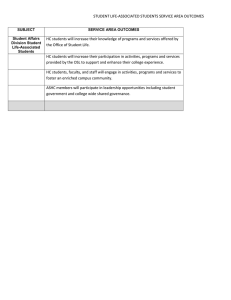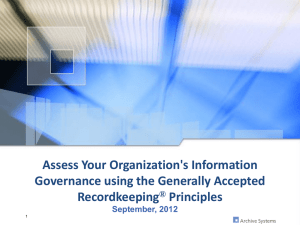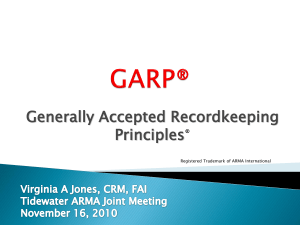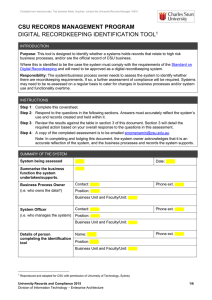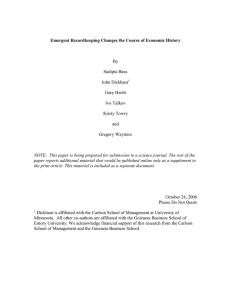Governance is a set of leadership and structures and meeting business objectives
advertisement
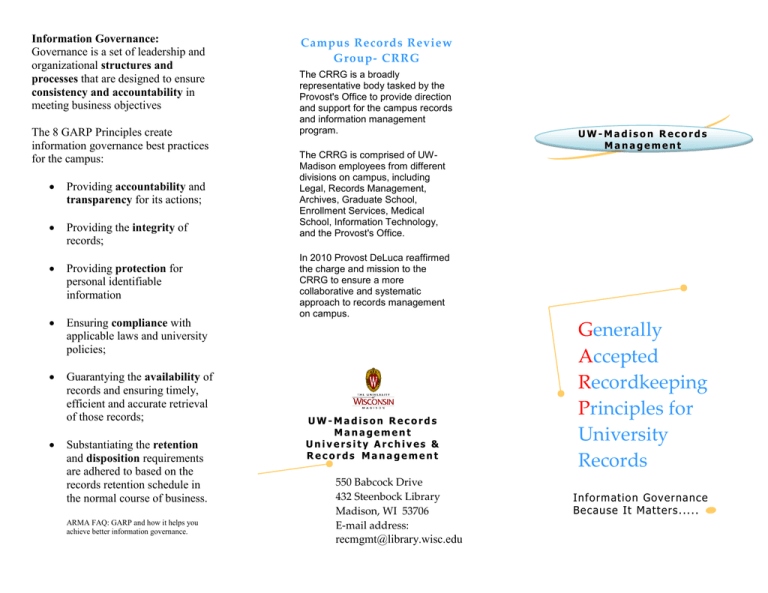
Information Governance: Governance is a set of leadership and organizational structures and processes that are designed to ensure consistency and accountability in meeting business objectives The 8 GARP Principles create information governance best practices for the campus: Providing accountability and transparency for its actions; Providing the integrity of records; Providing protection for personal identifiable information Ensuring compliance with applicable laws and university policies; Guarantying the availability of records and ensuring timely, efficient and accurate retrieval of those records; Substantiating the retention and disposition requirements are adhered to based on the records retention schedule in the normal course of business. ARMA FAQ: GARP and how it helps you achieve better information governance. Campus Records Review Group- CRRG The CRRG is a broadly representative body tasked by the Provost's Office to provide direction and support for the campus records and information management program. UW-Madison Records Management The CRRG is comprised of UWMadison employees from different divisions on campus, including Legal, Records Management, Archives, Graduate School, Enrollment Services, Medical School, Information Technology, and the Provost's Office. In 2010 Provost DeLuca reaffirmed the charge and mission to the CRRG to ensure a more collaborative and systematic approach to records management on campus. UW-Madison Records Management University Archives & Records Management 550 Babcock Drive 432 Steenbock Library Madison, WI 53706 E-mail address: recmgmt@library.wisc.edu Generally Accepted Recordkeeping Principles for University Records Information Governance Because It Matt ers..... Preamble: Records and recordkeeping are inextricably linked with any organized activity. It is only through the information an organization records in the normal course of business that it can know what it has done and effectively plan what it will do in the future. As a key resource in the operation of any organization, records must be created, organized, secured, maintained, and used in a way that effectively supports the activity of that organization, including: Facilitating and sustaining dayto-day operations Supporting predictive activities such as budgeting and planning Assisting in answering questions about past decisions and activities Demonstrating and documenting compliance with applicable laws, regulations, and standards 2009 ARMA International The 8 GARP® Principles for Campus Records Accountability An organization shall assign a senior executive who will oversee a recordkeeping program and delegate program responsibility to appropriate individuals, adopt policies and procedures to guide personnel, and ensure program auditability. Transparency The processes and activities of an organization’s recordkeeping program shall be documented in an understandable manner and be available to all personnel and appropriate interested parties. Integrity A recordkeeping program shall be constructed so the records and information generated or managed by or for the organization have a reasonable and suitable guarantee of authenticity and reliability. Protection A recordkeeping program shall be constructed to ensure a reasonable level of protection to records and information that are private, confidential, privileged, secret, or essential to business continuity. Compliance The recordkeeping program shall be constructed to comply with applicable laws and other binding authorities, as well as the organization’s policies Availability An organization shall maintain records in a manner that ensures timely, efficient, and accurate retrieval of needed information. Retention An organization shall maintain its records and information for an appropriate time, taking into account legal, regulatory, fiscal, operational, and historical requirements. Disposition An organization shall provide secure and appropriate disposition for records that are no longer required to be maintained by applicable laws and the organization’s policies.
